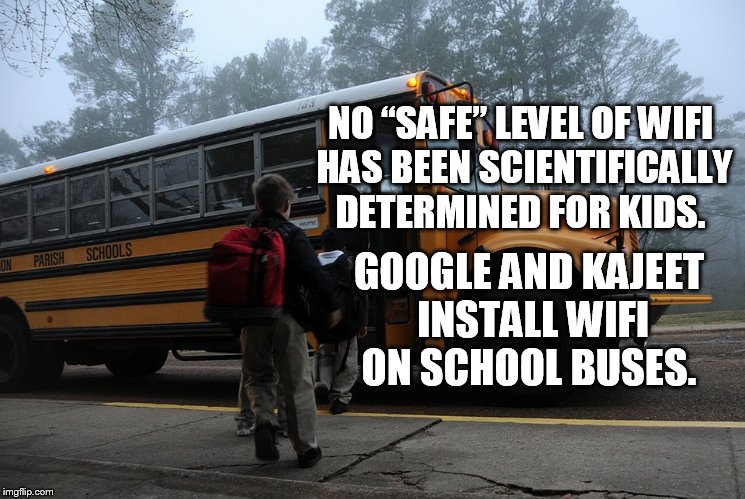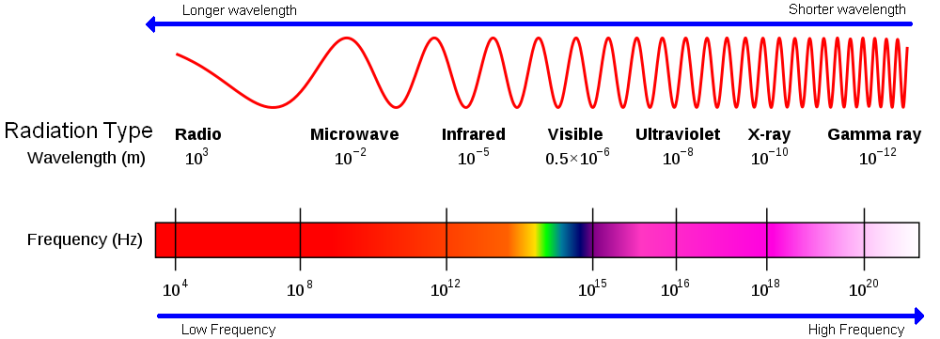 By B.N. Frank
By B.N. Frank
Last week, Bill Maher talked about on how every generation could be called the “What Were You Thinking?” generation. Carrying cell phones in our pockets was included in his list of current senseless behavior. WiFi on school buses so kids can put their lap tops and cell phones in their laps could be included as well.
Currently there are no national or international “standards” for safe levels of the radiation emitted by wireless or microwave devices – like laptops or cell phones used by children on school buses.
No “safe” level has been scientifically determined for children for when they use wireless devices – like laptops and cell phones on school buses.
Tech inventors have already been limiting their own kids’ exposure to new technology in their homes for many years and sending them to private low-tech schools. Due to the increase in “Digital Addiction” among children, tech inventors and investors have also been speaking against promoting technology use by children.
In February 2018, CBSNews.com posted “Cell Phones and Cancer: 8 Dumb Things to Boost Possible Cancer Risk.” #3 Dumb Thing is Encouraging Kids to Use Cell Phones
Warnings about kids using tech are not new. Since 2009, Dr. Oz has recommended that parents limit how much their children use cell phones because of exposure to radiation.
In 2011, The World Health Organization classified cell phone radiation and other sources of Wireless (WiFi) Radiation as a “Group 2B Possible Carcinogen.” Also included in their announcement:
- Children’s skulls and scalps are thinner. So the (wireless) radiation can penetrate deeper into the brains of children and young adults.
- …the impact of (wireless) radiation can be much larger (in children).
- So in addition to leading to a development of cancer and tumors, there could be a whole host of other effects like cognitive memory function…
In 2012, scientists revealed that exposure to cell phone and other sources of wireless (WiFi) radiation can disrupt the Blood-Brain Barrier which may cause it to leak.
There are actually many organizations that want schools to replace WiFi with wired Internet in school buildings and libraries because of health concerns.
Regardless, according to an April 3, 2018 article, “Kajeet re-emerges as Google’s partner for Wi-Fi on school buses,” WiFi is already in school buses in 34 American states.
Also according to the article, Kajeet, launched in 2003, originally sold phones specifically designed for children. According to the article, they don’t do that anymore which has “allowed Kajeet to focus solely on its sales of broadband to the education market, a market that it began probing in 2012 and engaged with fully in 2015.”
Today the company partners with 127 school bus fleets in 34 states to connect student riders to educational Wi-Fi on the bus—the company essentially installs a cellular modem on the bus that broadcasts a Wi-Fi signal to riders…
Kajeet also partners with over 400 school districts that provide students internet at home with Kajeet-branded hotspot devices.
…Sprint in 2016 announced its plans to offer free mobile devices and free high-speed wireless Internet connectivity to 1 million low-income, U.S. high school students.
And last but not least:
…Apple recently announced its own devices and services targeted to the education market.
Ever measured the radiation emitted from a WiFi router? Do you really want your kid sitting next to one of these to and from school?
Which brings us back to where we started:
- No “safe” level has been scientifically determined for children when using wireless devices – like lap tops and cell phones on school buses.
- Tech inventors have been limiting their own kids’ exposure to new technology for many years already – even sending them to private low-tech schools.
Even nuttier, it appears that there is WiFi installed on more American school buses than there are seat belts for kids to wear while riding in them. It seems this is usually because school districts can’t afford to install them and hire bus aides to make sure kids don’t use them to hurt other each other.
Now for a disturbing video featured on ABC show, Nightline: School bus rollover crash test, with and without safety belts.
According to PBS, “Only seven states have school bus seat belt laws on the books, but Louisiana and Texas have not approved the funding and Arkansas’ law is brand-new.”
Regardless, there are still “experts” who insist that it’s safer for kids to NOT wear seat belts on school buses. We all know how it is. Opinions are like noses. Everybody has one.
Decades of scientific research on exposure to cell phone radiation, wireless (WiFi) radiation, and electrical pollution (Electrosmog) has already proven that it can worsen pre-existing conditions even if didn’t cause them.
Some scientists believe there is enough research that proves wireless (WiFi) radiation should be reclassified as a Group A Carcinogen. Besides possible cancer risk, there are many symptoms and health conditions attributed to exposure to cell phone and wireless (WiFi) radiation and electrical pollution (Electrosmog).
Cell phones and other wireless and electronic devices have also been known to malfunction, catch fire and explode. Imagine that in a bus full of kids.
The Nation recently published an article comparing The Wireless Industry to “Big Tobacco” and “Big Oil.” The article has also been discussed by other publications such as Democracy Now. Last week, NPR featured the article and topic during their On Point program.
According to the National Institutes of Health, “The Precautionary Principle” in environmental science includes 4 central components:
- Taking preventive action in the face of uncertainty
- Shifting the burden of proof to the proponents of an activity
- Exploring a wide range of alternatives to possibly harmful actions
- Increasing public participation in decision making
Have you ever asked yourself, “If wireless radiation exposure is no big deal, why do manuals for cell phones, iPads, Wi-Fi Routers, etc. include guidelines and warnings?”
So WiFi on American school buses.
Jesus, take the wheel.
For more information, contact the following organizations:

